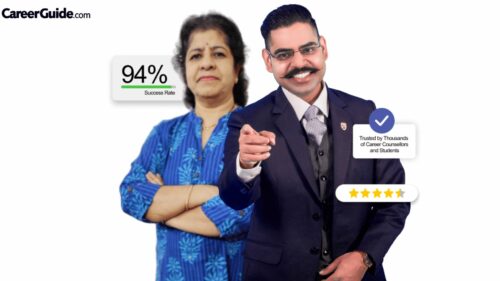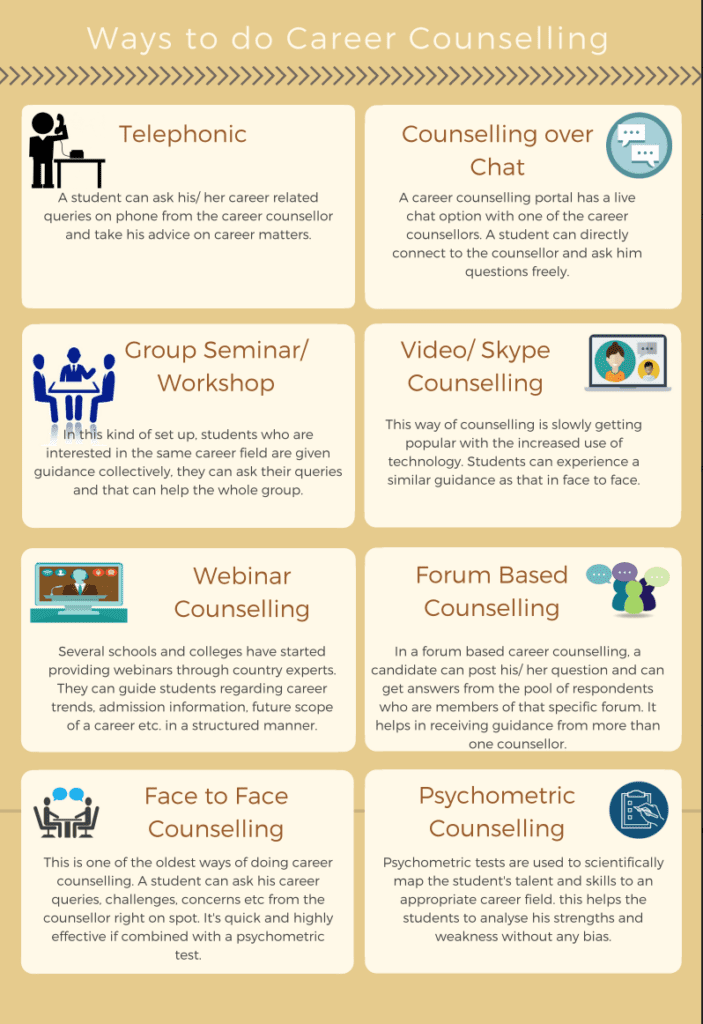The major difference between career guidance and career counselling is that guidance is broad advice or instructions given by someone more experienced or skilled, but counselling is professional advice given by a professional career counsellor on the personal or psychological concerns of people.
In our daily lives, we are frequently confronted with a variety of issues. To find the best answers to these challenges, we sometimes require the assistance of a second or third party. So the difference between career guidance and career counselling are useful in these situations. Though they appear to be relatively similar in appearance, they differ in terms of the scope of the assistance they provide. You will read difference between career guidance and career counselling.
Difference Between Career Guidance And Counselling
What Does the Term "Guidance" Mean?
Career Guidance is the counsel and instructions given to a person on a variety of issues by a more experienced or authoritative person. As a result, guidance usually refers to the process in which a person (usually with more knowledge or experience than the individual receiving the guidance) provides instructions, advice on better pathways, or solutions to find the correct answer to a problem . As a result, guiding occurs in practically all professions; nevertheless, guidance is more widespread in the subject of education. Students are guided throughout their educational paths by teachers, lecturers, or professors. For example, university lectures or instructors might help undergraduates identify better job paths by demonstrating the benefits and drawbacks of various careers they can pursue after graduation. You can also check guiding college students.
Furthermore, the difference between career guidance and career counselling has vital role even at work, the manager or the authoritative person leads his employees through the duties they must complete. Consider the assistance that a bank employee can provide you with your deposits. Even a basic example of elder siblings guiding younger siblings demonstrates how guidance can occur. As a result, the scope of assistance is broad, encompassing issues such as education, tasks, profession, finance, and psychology. It’s crucial to remember that advice is given by someone with more knowledge and someone with less experience on the subject.
Counselling is the professional guidance offered by a counsellor based on an individual’s personal or psychological concerns. In a nutshell, counselling is a type of psychological guidance for a person . As a result, unlike general advice, therapy is primarily intended to assist people in dealing with their mental health concerns. To become a professional counsellor, one must have considerable academic knowledge and training in the field of psychology, as well as a natural desire to assist others. A counsellor works directly with someone who requires psychological aid to improve his life situation. Furthermore, because counselling strives to treat and rehabilitate disordered mental patients, it involves a wide range of fields, including research, to provide the most correct psychological supervision, training, and direction to patients or individuals with psychological problems. As a result, unlike advising, counselling has a therapeutic focus .
What is the difference between career guidance and career counselling?
Guidance is general advice or instructions given by someone more experienced or skilled, whereas counselling is professional advice given by a counsellor based on the individual’s personal or psychological difficulties. This clarifies the fundamental difference between career guidance and career counselling. Another significant difference between career guidance and career counselling is its scope. Educational counselling, career guidance, financial guidance, and health guidance are all examples of guidance. Counselling, on the other hand, is primarily concerned with providing personal and psychological support. Practice is another difference between career Guidance and career Counselling. Anyone with more experience and understanding can provide useful advice to others. To provide counselling, however, one must be a professional counsellor with a recognized license to practise .
Q. What is Career Guidance?
A. Career guidance is a process that helps individuals understand their interests, skills, and values and how they align with various career options. It involves providing information about different occupations, educational paths, and employment trends. Career guidance professionals use assessments, interviews, and discussions to guide individuals in exploring potential career paths . The primary goal of career guidance is to assist individuals in making informed decisions about their careers.
Q. What is Counselling?
A. Counselling, on the other hand, is a broader field that focuses on addressing individuals’ personal, emotional, and psychological issues that may impact their career decisions. Counsellors help individuals explore their thoughts, feelings, and concerns related to their careers and provide support in dealing with challenges such as self-doubt, anxiety, or lack of confidence. Counselling aims to enhance individuals’ self-awareness, self-esteem, and decision-making abilities.
Q. How do they differ in their focus?
A. Career guidance primarily focuses on providing information and resources related to career exploration, such as job market trends, educational requirements, and skills development. It emphasizes helping individuals identify suitable career options based on their interests, aptitudes, and goals .
Conclusion
When we are confronted with life’s most pressing issues, both career guidance and counselling become essential. As a result, guidance and counselling can assist us in identifying the finest options to help us overcome these issues. Though they appear to be the same thing, guidance and counselling are not the same things. Guidance usually refers to the general process of leading someone by advice or another method to address difficulties, whereas counselling refers to a professional counsellor’s advising procedure focused on the personal or psychological problems of the people difference between career counselling and career guidance.
FAQs about difference between career guidance and career counselling
Q. What is the main difference between career guidance and career counselling?
A. Career guidance primarily focuses on providing information, resources, and support to help individuals explore career options and make informed decisions. Career counseling, on the other hand, delves deeper into personal and emotional factors, addressing issues such as self-esteem, confidence, and work-related challenges.
Q. Does career counseling involve psychological assessments?
A. Career counseling often involves psychological assessments to gain insights into an individual’s personality, interests, values, and skills. These assessments can help identify potential career matches and provide a deeper understanding of an individual’s strengths and weaknesses.
Q. Is career guidance more focused on education and training?
A. Yes, career guidance often places emphasis on educational pathways, training programs, and skill development relevant to various career options. It assists individuals in understanding the educational requirements and opportunities associated with different careers.
















